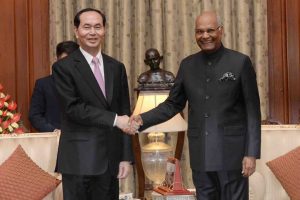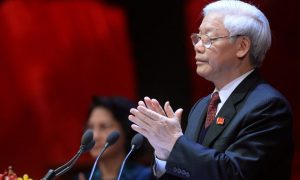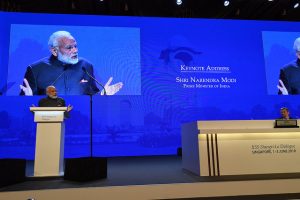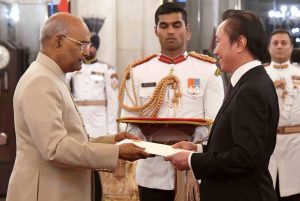
The Hanoi-Delhi bonding is set to shine anew as India’s President Ram Nath Kovind heads to Vietnam on a three-day visit that will deftly blend culture, business and deepening strategic connect between the two time-tested partners.
The visit begins on November 18, with a visit to the picturesque coastal town of Da Nang, where the president’s itinerary revolves around trips to My Son Hindu temple complex and UNESCO Heritage sites, which will underscore centuries-old cultural connections between India and Vietnam.

Hanoi is set to roll out the red carpet for the Indian president. In a special gesture that underscores special ties between India and Vietnam, President Kovind has been invited to address Vietnam’s National Assembly, a singular honour as he will be the second foreign leader after Chinese President Xi Jinping to speak at the Vietnam parliament. Mr Kovind’s visit follows high-level visits by Vietnam’s prime minister and president a few months ago, which makes 2018 a unique year in the annals of India-Vietnam relations.
The overarching message behind President Kovind’s visit is to underscore the emerging role of Hanoi as India’s pivot in Act East policy and a balancer in Southeast Asia amid China’s growing assertiveness. For New Delhi, Mr Kovind’s visit offers a timely opportunity to hold first engagement with President Nguyen Phu Trong, Vietnam’s most powerful leader since Ho Chi Minh as he blends the posts of General Secretary of the Communist Party of Vietnam, President of the Socialist Republic of Vietnam and head of Central Military Commission.
Shaping peaceful Indo-Pacific

The visit is largely symbolic, but will also have substantive geopolitical and bilateral issues on the agenda. The president’s visit takes place amid the continuing geopolitical flux in the region and new developments in South China Sea, which are propelling India and Vietnam to impart more depth to comprehensive strategic partnership firmed up during Prime Minister Narendra Modi’s visit to Hanoi in September 2016.
Issues relating to the evolving concept of the Indo-Pacific will be on the agenda, with Vietnam’s newly-appointed ambassador Pham Sanh Chau pitching for greater cooperation between India and Vietnam in shaping a peaceful and harmonious region. Having China as its largest trading partner and its immediate neighbour which aspires to be a global power, Hanoi is treading cautiously on the Indo-Pacific as well as the Quadrilateral dialogue among India, the US, Japan and Australia. A day after the Quad countries held their third dialogue in Singapore within a year, the Vietnamese envoy struck an ambivalent note, saying that while Hanoi welcomes any initiative to bring peace and stability in the Indo-Pacific region, it is opposed to the formation of any military alliance which will make the region a playground of great power rivalries. “Vietnam welcomes any initiative for maintenance of peace, security, freedom of navigation and overflight in the region. However, we do not want to see a military alliance formed because we believe that it is not conducive to the security environment in the region,” he said ahead of the visit. “If any country wants to gang up, use force or trying to use force, then it goes against the position of Vietnam,” he said.
Vietnam’s ambivalence on the Quad is understandable, but there is no dissonance with New Delhi on this front as India, too, does not want militarisation of the Quad and has resisted proposals by the other Quad countries to raise the dialogue to the level of foreign secretaries. Besides, PM Modi, in his Shangri-la Dialogue address in Singapore on June 1, has already rejected China containment as a driving imperative behind the Quad, and has pitched for an inclusive Indo-Pacific, which is open to nations, big and small. Hence, Vietnam and India are on the same page as far as reducing the Indo-Pacific to zero sum games is concerned. With this as a backdrop, India and Vietnam are expected to join hands in promoting an inclusive, balanced and prosperous Indo-Pacific region.
Focus on South China Sea

Latest developments in South China Sea, with China coming under attack for increasing militarisation of artificial islands and reefs in the disputed waters, will also be high on the agenda. Mr Kovind’s interactions with Vietnam’s top leadership in Hanoi will underscore the convergence of positions on constructive bilateral and regional cooperation to promote freedom of navigation and overflight in the contested waters of the South China.
Geopolitics aside, the visit will see new initiatives to scale up defence and security cooperation between India and Vietnam. In this regard, the two sides are expected to identify concrete projects under the $500 million Line of Credit pledged by India during PM Modi’s visit to Hanoi in 2016. Enhancing cooperation in development and capacity building projects – the forte of India-Vietnam relations – will feature prominently during the delegation-level talks in Hanoi.
Trade: Raising the Bar

With Vietnam emerging as a manufacturing hub and a sunshine economy in the region, the two sides will be looking to raise the bar for their economic partnership. India-Vietnam bilateral trade is currently around $9 billion. The two sides have set a target of scaling up bilateral trade to US$15 billion by 2020. The India-Vietnam Business Forum, which will be addressed by President Kovind in Hanoi on November 19, should provide a roadmap for reaching the $15 billion target and for upscaling two-way investment. “There is huge potential for trade to grow further. We are looking at further bolstering the time-tested relationship between the two strategic partners,” said the Vietnamese envoy.
In this regard, expanding partnership in hydrocarbons, green energy and joint development of blue economy can play an important role.
Author Profile

- Manish Chand is Founder and Editor-in-Chief of India Writes Network (www.indiawrites.org) and India and World, a pioneering magazine focused on international affairs. He is CEO, Centre for Global India Insights, an India-based think tank focused on global affairs.
Latest entries
 India and the WorldFebruary 27, 2026Modi visit: India-Israel partnership enters a new era
India and the WorldFebruary 27, 2026Modi visit: India-Israel partnership enters a new era India and the WorldFebruary 24, 2026Unravelling Modi’s Israel journey: What to expect
India and the WorldFebruary 24, 2026Unravelling Modi’s Israel journey: What to expect India and the WorldFebruary 17, 2026South-by-South: Focus on people-centric solutions at India AI summit
India and the WorldFebruary 17, 2026South-by-South: Focus on people-centric solutions at India AI summit India and the WorldFebruary 7, 2026Modi hails interim India-US trade deal, Goyal says no concessions made on agriculture
India and the WorldFebruary 7, 2026Modi hails interim India-US trade deal, Goyal says no concessions made on agriculture







